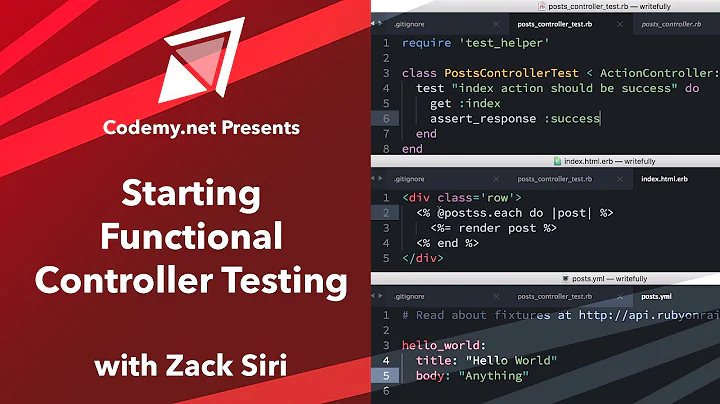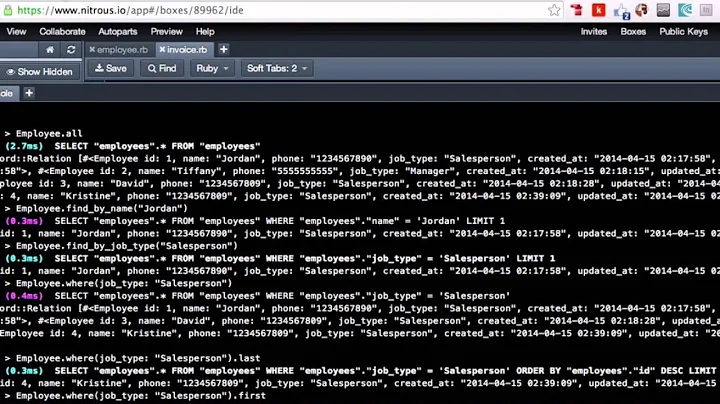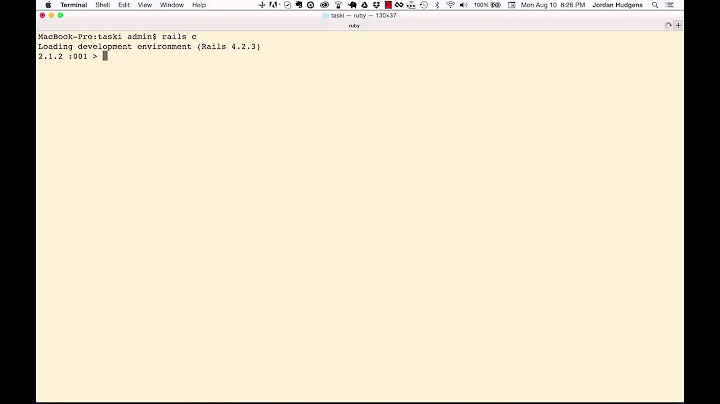Load and use fixture in rails console
Solution 1
You should be able to load your fixtures prior to entering console. Like this:
RAILS_ENV=test bin/rails db:fixtures:load
RAILS_ENV=test bin/rails console
However, you still won't be able to access your fixture data like you would in a test. This simply loads your test database with your fixtures data. So you'd still have to do something like:
user = User.find_by(name: "John")
But, you can still create shortcuts for this sort of thing. You can add any ruby code you'd like to your ~/.irbrc. I suggest creating a .railsrc file as described here. You can then set up things like:
john = User.find_by(name: "John")
So now you can just start referring to the variable 'john' after console loads. Incidentally, the post I linked to shows how to set up a global .railsrc file, but you could set it up so that you had a per project .railsrc. Or, if you want something a little less fancy, but easy to do... just create a ruby file in your project (maybe 'shortcuts.rb'). After console is loaded, just do a require 'shortcuts'.
Solution 2
May be late... Rails 4
require 'active_record/fixtures'
ActiveRecord::FixtureSet.create_fixtures(Rails.root.join('test', 'fixtures'), 'users')
Solution 3
You can load fixtures into your development database too:
$ rake db:fixtures:load
$ rails c
> require 'active_record/fixtures'
> john = User.find ActiveRecord::FixtureSet.identify('john')
Solution 4
So I had a similar but slightly different need. I wanted to use my existing fixtures (from my rspec test) to populate my development database. This is how I did it by adding a new task to my rake file (located in libs/tasks/*.rake):
task d_populate: :environment do
require 'active_record/fixtures'
fixtures_dir = File.join(Rails.root, '/spec/fixtures') #change '/spec/fixtures' to match your fixtures location
Dir.glob(File.join(fixtures_dir,'*.yml')).each do |file|
base_name = File.basename(file, '.*')
puts "Loading #{base_name}..."
ActiveRecord::Fixtures.create_fixtures(fixtures_dir, base_name)
end
end
If you combine this with a db:reset you can populate your development environment at will by adding this to your rake task as well:
task reseed: [:environment, 'db:reset', 'db:d_populate']
Then you can call rake db:reseed to populate from fixture YAML files.
Solution 5
You can load a fixture in the Rails 3.2 console as follows:
require 'active_record/fixtures'
ActiveRecord::Fixtures.create_fixtures FIXTURE_PATH_HERE, MODEL_NAME_HERE
Related videos on Youtube
Patrick Pruneau
Always in search of better knowledge and working method!
Updated on November 17, 2020Comments
-
Patrick Pruneau over 3 years
I wonder if there's a way to load and/or use fixture in rails console. Actually, I'd like to create a user from my fixture
users.ymlto do some testing without having to go through all the "pain" of doingUser.new(:name = "John", :email = "..")each time.
I am currently in test environment (rails c RAILS_ENV=test).If it's not a good way to do things, please say it. I'm new to Rails so I'm here to learn :)
-
Tiemen almost 12 yearsThanks for that answer - however (in Rails 3.2.5, at least) the command is: rails c test
-
Rob over 8 yearshmm ... that didn't work for me, but this does: rake db:fixtures:load RAILS_ENV=test FIXTURES_PATH='spec/fixtures' FIXTURES=users,participants
-
 Masa Sakano over 3 yearsAs of Rails 6.0,
Masa Sakano over 3 yearsAs of Rails 6.0,rails c testdoes not seem to work. Do insteadRAILS_ENV=test rails c -
Ryan Sandridge over 3 years@MasaSakano LOL... back to my original answer 😂
-
James H almost 3 yearsThis is the most up to date way to do it as of Rails 6.
FIXTURES_DIRmay be used to specify a sub directory of test/fixtures.FIXTURES_PATHmay be used to specify any path.





